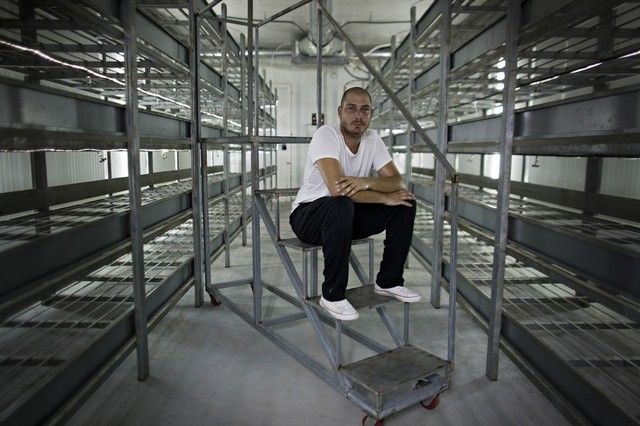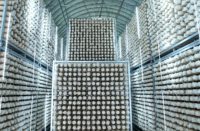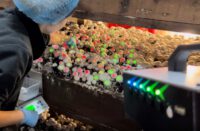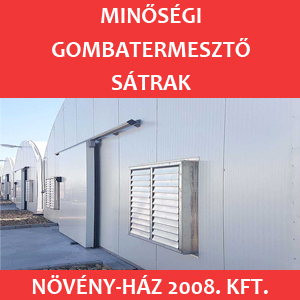When Mahmoud Kuhail thinks about why he decided to open his mushroom farm, the first in the West Bank, he remembers as a young child watching his grandmother picking wild mushrooms in Hebron and Jerusalem.
Decades later and his Amoro Agriculture business was growing enough mushrooms to supply 80 per cent of the Palestinian market.
But that was until three months ago when, slow and costly Israeli customs procedures on imports to the occupied West Bank and an unfair advantage given to their Israeli competitors finally took their toll.
Amoro, set up by Mr Kuhail and his two partners nearly four years ago, sprang from the absence of local mushrooms in the West Bank. After a year in business, Amoro took over Israel’s monopoly of the Palestinian mushroom market.
Amoro used to rely on the Israeli port of Ashdod to import the compost necessary to grow their produce. However, Israeli authorities held the container for 80 days at the port, and made the small mushroom farm pay around US$1,200 (Dh4,400) per day for storage, and other expenses until it was released.
Israeli mushroom farmers import the same raw materials from the same supplier in Holland as Amoro, but it takes only one or two days for their containers to be processed.
After sitting for three months at the port upon arrival, the quality of Amoro’s compost also decreases.
“In this sense, we can’t compete with the Israeli grower and we can’t sustain our business,” said Mr Kuhail. Furthermore, Israel sells quality B products in the West Bank at the same price as the quality A products they sell in Israel, he explained. “It’s a very lucrative market for Israel to sell their trash into our market,” he said.
Because of the Israeli occupation, Palestinian businesses do not have access to borders and crossing points to import and export their products from the West Bank.
Israeli authorities’ support for their own growers has put Palestinian farmers like himself at a disadvantage, said Mr Kuhail.
The considerable trade deficit between Israel and Palestine — $5.2 billion in 2015 — exacerbates the challenges Palestinian farmers face.
A UN report weighing the effect of Israeli occupation on the Palestinian economy found that “the Gaza Strip and West Bank, including East Jerusalem, remain under Occupation with tight restrictions on the movement of people and goods; systematic erosion and destruction of the productive base; losses of land, water and other natural resources; a fragmented domestic market and separation from international markets”.
The UN report also found that the 26 per cent unemployment rate in the West Bank means that 12 per cent of the employed population in Palestine has to work in the Israeli settlements.
Mr Kuhail recounted the experience of a woman picker at Amoro who had previously worked at a settlement near Jericho and paid half of her income to a middleman in exchange for transportation.
“We give her 90 shekels (Dh87.50), we respect her, and give her a decent work environment,” said Mr Kuhail, adding that he hopes his employees can return to work once they can get the business going again.
Water shortages from the Israeli occupation of Palestinian Territories pose another major challenge to the West Bank’s agriculture sector.
While Amoro is not dependent on large quantities of water, as mushrooms do not require strong irrigation, every farmer he knows is suffering from water shortage.
Ezzan Bregit, 58, has been a farmer for 24 years in the small village of 18,000 people near the Palestinian city of Hebron.
Mr Bregit requires 200 cubic meters of water to irrigate his ten dunams of land, BUT he receives only 50 cubic meters from the municipality’s pipeline, controlled by Israel. Mr Bregit tried to build a water storage tank on his property, but was denied permission by Israeli authorities. Farmers who wish to buy more water must pay double or triple the normal price.
Most Palestinian businesses, according to Mr Kuhail, do not receive business development services from the Palestinian Authority, which governs the West Bank.
“There is no implementation of law or procedures from the Palestinian authorities,” he said. “[Palestinians] don’t know if a product is coming from the settlements or Israel.”
Government negligence such as this has resulted in Israeli mushroom companies packaging and selling their produce with Amoro’s label in the West Bank. “We talked to the border police but nobody is doing anything about it,” said Mr Kuhail.
Now, Amoro is looking for new ways to circumvent the challenges by building the first compost yard in the region.
“We can’t take a step back, we have to take two steps forward,” Mr Kuhail said.
Since Amoro was launched, the company has managed to yield 25kg of mushrooms per square metre from the 30kg guarantee yield of the Dutch compost they were previously using.
With the new compost yard they are building, scheduled to be operational in December, Mr Kuhail hopes that “step by step we will be able to reach the 30 kilogram target. We may not be able to reach 30kg per square metre the first time, or the second time or the third time, but at the end of the day we will be able to compete,” he said.
Amoro also has the option of importing compost from Israel at a higher price, which would have gone against their principle of boycotting Israeli products in the West Bank.
“At the end of the day [this] is a business environment; they don’t have to make it easy for us,” said Mr Kuhail. “They [Israelis] need to make money, we need to be creative.”












